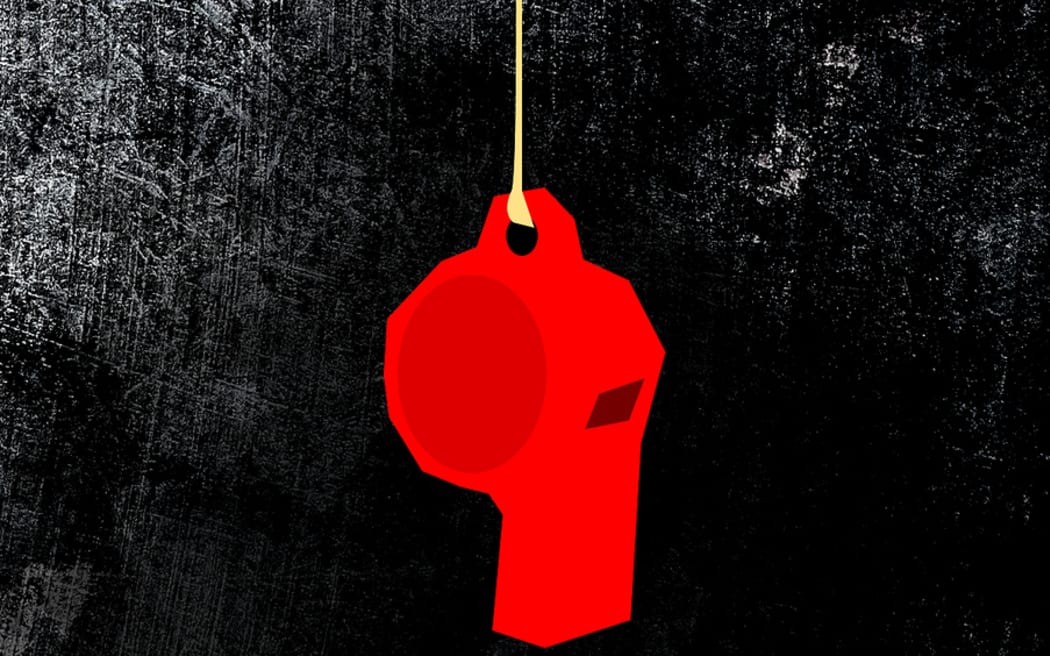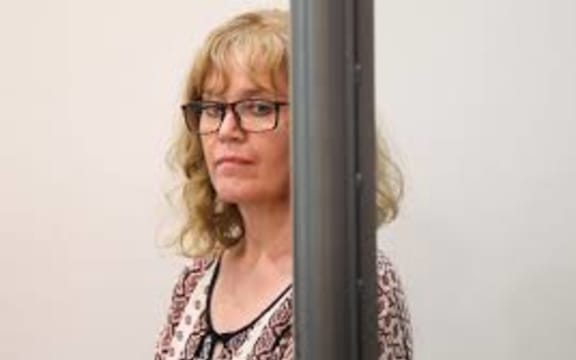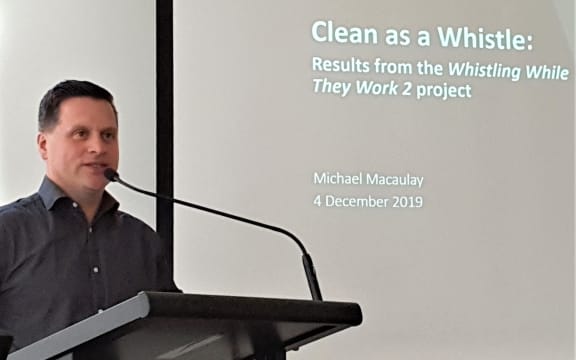The Protected Disclosures Act was updated for the first time in 20 years recently with little fanfare or media attention. The government says it better protects whistleblowers who stick their necks out to report wrongdoing where they work - but not if they go to the media with it. Why not? Does this matter?

Photo: Flickr
Last month Kim Hill had a long and startling conversation on RNZ National with British journalist Meirion Jones, maker of a startling documentary ten years ago revealing that Jimmy Savile was a serial sex offender over the decades that he’d also been a British media superstar at the BBC.
“I was absolutely 100 percent in a whistleblower position. The BBC had covered up Savile for 30 years. Now they were covering up that cover-up by refusing to put out our film,” he told Hill.
The BBC got cold feet and walked away from the project and Jones’ film was eventually broadcast by rival company ITV. It kicked off a fresh police investigation after Savile died in 2011 and only then was the scale of his crimes made plain in the media.
But plenty of people in the media claimed to have known at least some of what Savile was up to.
In 1990 journalist Lynn Barber wrote in The Independent that most of her British journalist peers thought he was a pedophile. Comedians even joked about it obliquely from time to time on prime time TV - including, astonishingly, Savile himself.
"For decades, Jimmy Savile got away with this because every time anybody got close to revealing it British libel law kicked in and there was no way of telling that story without being sued,” Merion Jones told Hill in May.
But the other part of the story is a failure to protect whistleblowers.
Once the truth was out the BBC contacted ten of thousands of former employees to ask if we knew anything more. It was far too little, far too late - and as stark a case study as you could ever get of failure of protected disclosure.
How the law protects whistleblowers - and doesn’t

Photo: Supplied
The Protected Disclosures Act became law in New Zealand in 2000 to back up people blowing the whistle on misconduct at their own workplace - but crucially, only if they raised concerns with employers first.
Last month it was replaced with the new Protected Disclosures (Protection of Whistleblowers) Act 2022. This extends protection to those who go to “an appropriate external authority.”
The Chief Ombudsman is one such authority.
"Our reputation as an honest society free from corruption depends on it," he said, hailing the law change.
But anyone exposing wrongdoing to the media will have no extra protection at all.
In Australia, some states protect workers who go to the media as a last resort. New South Wales protects those who have not had success having "honest concerns" properly investigated.
One of the cases that prompted a review of our law here was a security guard who did just that.
Lydia Maoate - with the backing of her union - told the Dominion Post newspaper in 2010 her employer encouraged staff to cheat in their training.
But there was nothing she, the union, the Employment Relations Authority, or the newspaper - could do about her subsequent sacking.
So why don't the media count as an appropriate external avenue under our brand new whistleblowing law?
Back in 2018 the initial discussion document said:
“It’s complicated. People could simply get it wrong, or worse, deliberately make a false claim, which could cause unfair reputational damage to the people involved in the public domain.”
"Providing protection for such persons would unfortunately open the door to 'get even' complaints which even if found to be untrue, would nevertheless tend to operate on a 'no smoke without fire' basis,” Business NZ said in its submission.
The media weren't consulted before that discussion document was prepared.
In the only media submission before the deadline, TVNZ’s general counsel Brent McAnulty said this was based on the unfair assumption the media don't investigate whistleblowers' claims before reporting them. He said compliance with Broadcasting Standards Authority codes and Media Council principles also help ensure accuracy and fairness - in addition to journalists’ own professional ethics.
He cited examples of TVNZ reporting of wrongdoing in the public interest:
-
the melamine milk contamination where Fonterra managers knew about it but did not announce a public recall to stop parents feeding it to their babies;
-
Pike River Mine employees complained about safety issues after the management shut them down;
-
the reports of inappropriate behaviour at Cycling New Zealand which was not acted upon until 1 News revealed concerns had previously been raised internally by both athletes and staff.
As we know from recent news, subsequent investigations are still revealing serious shortcomings at Cycling New Zealand.
But the Select Committee wasn’t persuaded by that and the Bill went through unchanged in that respect. Only one journalist - Jason Brown - argued the case for extending protection for the media in a submission that’s publicly available, before it passed into law in May.
Debbie Gee is a former Radio New Zealand and TV3 reporter who’s now a director of anti-corruption watchdog Transparency International NZ.
“I'm not particularly disappointed or surprised because ... the question of protected disclosures to the media was specifically excluded from the consultation that was launched,” she told Mediawatch.
“Whistleblowing to the media, which is sometimes called leaking, is just one form of disclosure. Our view is that people tend to go to the media because they don't know where to go or they don't trust where they're supposed to go,” she said.
Gee is also the co-author of Taken for a Ride, a study of how Joanne Harrison defrauded the Ministry of Transport over a four-year period when at least four colleagues blew the whistle internally.
By the time that hit the headlines in 2016 it was too late. She’d gone overseas and carried on offending. Three years later Stuff Circuit had to go to court to lift a suppression order and reveal the full extent of it all.
“At the time these concerns were raised at the Ministry of Transport, there was no actual evidence of fraud per se - but evidence of repeated failures to follow clear procedures and policies in relation to contracting and procurement, which raised red flags with some people. And only one (person) actually made a true protected disclosure about that,” she said.
“They only went to the media after it had already become public. A lot of people who want to raise issues would love to have another, but also confidential, means to raise those concerns,” she said.

Michael Macaulay launches the 'Clean as a Whistle' report for Transparency International in December 2019. Photo: Transparency International NZ
The Clean as a Whistle report in 2019 found only 2 percent of people went outside the organisation to blow the whistle in the first instance.
Does that mean there wouldn't actually be any point in extending protections to people who go to the media?
“There is a place for the media. Both Australia and Canada have mechanisms to protect disclosures under very stringent circumstances if they do go to the media. So I think it's something that should be looked at in the future, but there are other areas where we think the the new legislation is deficient,” Gee told Mediawatch.
In recent years, media organisations have been searched by police and individual journalists have been subjected to police investigations, looking for the source of contentious information.
The Clean as a Whistle report also said:
“The effectiveness of public whistleblower protections has been directly undermined by recent evidence of the extent to which journalists and media organisations can still be forced to reveal information about their confidential sources, so as to jeopardise those sources; and indeed, could themselves be targeted for receiving and publishing information from those sources.“
“I also do think that a lot of people who want to raise issues of serious concern ... don't necessarily want to put the reputation of the organisation they work for into the public spotlight. Most people would tend to prefer a more discreet way of raising it,” she said.
The minister in charge of this process Chris Hipkins has hailed the new law as strengthening whistleblower protections for the good of the public and in the long run.
“This Bill was simply watered down really. This was a law that was 20 years old and this was a chance to give it a really thorough going-over and to put some really much strengthened procedures in place - whether or not that included the media,” Gee said.
“It's been improved lightly in some areas, but it just doesn't go nearly far enough, particularly in terms of the support for the well-being of people who want to make protected disclosures. That's still deficient. The Ombudsman has been asked to do some further work on things that can be put in place," Gee told Mediawatch.


